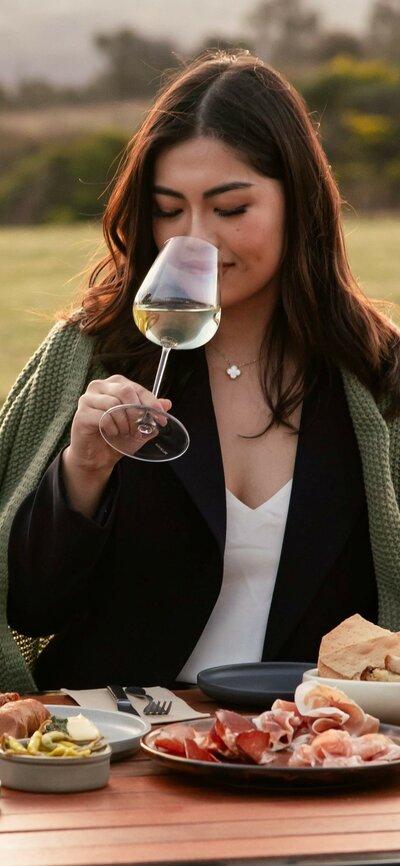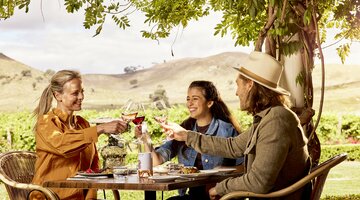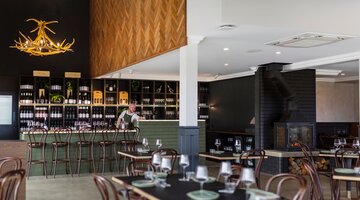
Why the Canberra District Wine Region is crushing the grape game
Updated 21 Aug 2025
Learn about the must-visit wineries within the Canberra District Wine Region
Discover Canberra's unique and diverse wine scene through the eyes of Emma Shaw, a former public servant who was also drawn to the world of viticulture. Unwind with tastings, vineyard stays, and more for your ultimate weekend escape.

It’s perhaps unsurprising that the dynamic wine scene in Canberra was started by scientists. In the 1970s, a handful of grape-loving CSIRO researchers surveyed the soils and climate surrounding the city and, noticing similarities with Bordeaux and Burgundy, promptly staked out sheep paddocks to have a go at growing grapes.
Their vines thrived, especially shiraz and riesling, which quickly became the definitive grapes of a fast- growing region. Some 50 years later, those pioneering vineyards are still going strong and a new wave of growers has planted varietals from sangiovese and tempranillo to fiano, establishing the Canberra Region Wine District as one of Australia’s most respected – and experimental – cool climate producers.
“The potential of this region excites me,” says Emma Shaw, a former public servant who was also drawn to the world of viticulture. “It’s becoming known for producing really refined and distinctive styles. You can spot a Canberra shiraz – a perfumed, spicy, elegant wonder – from a mile away.”
For her nine-to-five, Shaw is the general manager at Collector Wines, the label of “visionary winemaker” Alex McKay. On Saturdays, she holds a wine-tasting pop-up (canberracellardoor.com.au) at the Canberra and Region Visitors Centre, where she also runs classes and helps out travellers looking for a crash course on local drops. “There are no silly questions,” she explains. “My aim is to get people
excited about the quality of the wines they can explore around the region.”
Where to start? That depends on your palate. The district sews together more than 300 hectares of vineyards, reaching from northern ACT to the Yass Valley and Lake George in NSW. Most are within a half-hour-or-so drive from the capital.

Local styles can be roughly divided into three sub-regions, the diversity of the terroir expressed most clearly in shiraz, the flagship red. The vines in Murrumbateman produce “a more muscular wine with power that might be unexpected from our cool climate region”, says Shaw. Grapes grown by Lake George and around Bungendore are cooled by an evening easterly dubbed “Bateman’s Breath”, which blows in from the coast of Batemans Bay. “You get wines, especially shiraz, with a real depth of character.” Conditions in Hall/Wallaroo, about 40 kilometres west of Lake George, tend to be warmer, with granite soils lending “an ethereal quality and an aromatic, floral perfume, which is divine in a cool climate shiraz”.
More than 30 wineries across the region have cellar doors and you could easily spend three unhurried days tasting your way around. Shaw steers first-timers to Murrumbateman’s Clonakilla Wines, 40 kilometres north of Canberra. The winery is on land that one of those enterprising CSIRO staffers, Dr John Kirk, planted in 1971 and is now internationally renowned, particularly for its shiraz viognier. These days, John's son, Tim Kirk, oversees the winemaking. “He’s producing a beautiful grenache blend, a non-vintage muscat that is very special and some other wines that are only available here at the property,” says Shaw.
At an old schoolhouse nearby, another scientist, Ken Helm, mans the bar at Helm Wines, pouring drops made from grandfather vines he planted in 1973. He’s called the “riesling king” around here, says Shaw. The 2023 vintage, all lemony on the nose and a balancing act of acid, fruit and texture, can be drunk now or cellared for 25 years.

At 860 metres elevation, Bungendore’s Lark Hill Winery is a biodynamic operation that produces vibrant grüner veltliners and rieslings. They are best sampled over a plate of swordfish with caper butter, available on weekends at the onsite restaurant. For another luxurious lunch option, Shaw says Nick reckons Nick O’Leary’s Heywood winery in Wallaroo is hard to beat. “He’s producing great tempranillo,” she says, noting that the charred sweet-ness of anything from the grill would be an ideal match. “His riesling is some of the best in the region; it’s flavourful, intense and expressive” – and great with oysters. There’s also a scorched zucchini dish, served with sheep’s milk yoghurt and peaches, that pairs beautifully with the flintiness of Heywood’s 2022 Denison Chardonnay.
Yarrh Wines, which takes its name from the Ngunnawal word for running water, is located east of Murrumbateman and is reached via a winding road that runs over a creek and through a forest of stringybarks. The rammed-earth cellar door was built using straw bales — a tangible sign of the commitment to sustainability that underpins every aspect of the business.
“I think you can see that quality in the wines when you taste them,” says Shaw, who suggests doing a tour before lingering with a glass of “really elegant” shiraz or a textural fiano and soaking up the view. “The Yarrh property is a gorgeous, very still and quiet place.” The whole region is full of gentle hills punctuated by tall poplars, she adds. “The French have a saying: ‘Syrah [shiraz, as we call it] loves a view.’ The best winemaking sites in the world are simply beautiful places to be.”